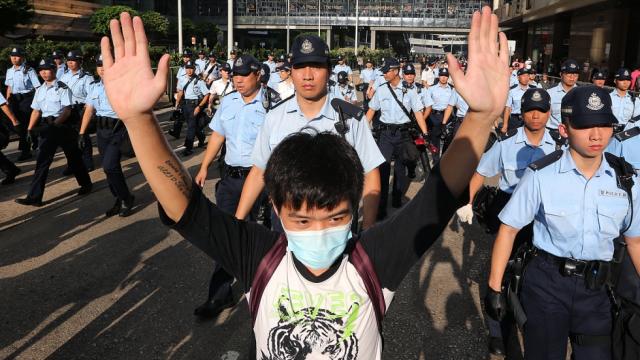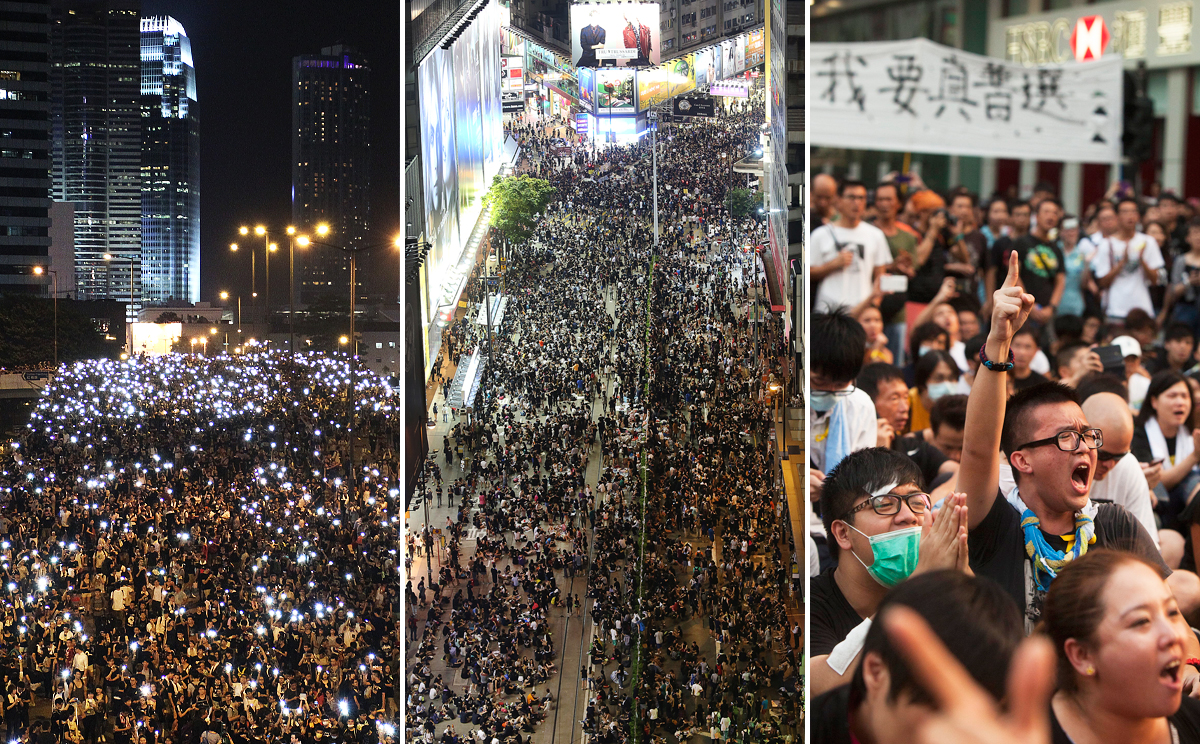
Protesters in Hong Kong on Tuesday ignored calls from the region’s chief executive to abandon pro-democracy demonstrations as numbers grew on the eve of a public holiday.
The protests had thinned overnight – after peaking in the tens of thousands – but by lunchtime on Tuesday more people were arriving at the scene again. Some said they were protesting in “shifts,” giving friends time to go home and rest before returning. Others took the opportunity of smaller numbers in the early morning to clean the roads.
One of the organizers, Alex Chow of Hong Kong’s Federation of Students, told a press conference more protesters were preparing to join. He said the demonstrations could also be widened, including strike action and sit-ins of government buildings, if authorities failed to meet the protest demands.
Wednesday is National Day in China, which marks the 65th anniversary of the founding of the People’s Republic of China under Communist party rule. The organizing group Occupy Central with Love and Peace has called for people to maintain the momentum of the protests into the public holiday.
Hong Kong’s chief executive, Leung Chun-ying, had earlier urged protest leaders to immediately withdraw demonstrators from the center of the city, as they continued to call for his resignation.
“Occupy Central founders had said repeatedly that if the movement is getting out of control, they would call for it to stop,” Leung said. “I’m now asking them to fulfil the promise they made to society, and stop this campaign immediately.”
In a short speech before he chaired the executive council’s weekly meeting, he sought to head off calls for his departure, warning: “Any personnel change before the implementation of universal suffrage is achieved would only allow Hong Kong to continue to pick its leader under the election committee model.”
The protests have been sparked by Beijing’s insistence that universal suffrage for the 2017 election of the next chief executive must be tightly controlled, with a committee stacked with pro-Beijing sympathizers picking a handful of candidates. Underneath that lie broader concerns about the future of the region and its ability to protect its identity and freedoms.
On Sunday police used teargas in vain attempts to disperse protesters – instead bringing many more on to the streets in reaction.
Chan Kin-man, one of Occupy’s co-founders, renewed its call for Leung to quit.
“If Leung Chun-ying announces his resignation, this occupation will be at least temporarily stopped in a short period of time, and we will decide on the next move,” he told reporters.
“This would be a very important signal, then at least we know the government has changed their attitude and wants to solve this crisis.”
New figures released by Hong Kong University’s public opinion program – taken before the current wave of protests started – gave Leung a net popularity rating of minus 35 percentage points, with an approval rate of 21% dwarfed by a disapproval rate of 57%. The government’s approval rate is minus 20.
Previous work by the program has shown the rate of people lacking confidence in the “one country, two systems” formula – which has allowed Hong Kong considerable autonomy – at its highest rate since polling began 21 years ago. As many as 56% said they lacked confidence, while 38% were confident.
Whether Occupy Central will be able to control the movement if it seeks to do so is uncertain: the massive gatherings were sparked by student protests, and many on the streets do not identify themselves as Occupy Central protesters.
Chan told the Guardian on Monday he hoped the movement would continue until at least Wednesday, and would then announce new plans.
“It is not realistic for people to occupy Central forever ... We have to be careful not to invite a backlash,” he said.
So far the anti-Occupy groups have been relatively quiet about the protests. But Robert Chow of the Silent Majority group, which has opposed the movement, said: “What Occupy Central has achieved is simply holding Hong Kong hostage and disrupting the livelihood of general Hong Kong people.
“If they persist in blocking traffic I think the people of Hong Kong will get angry.”
The White House on Monday urged authorities in the region to show restraint in responding to the sit-in, and called on protesters to express themselves peacefully.
“We believe that an open society with the highest possible degree of autonomy, and governed by the rule of law, is essential for Hong Kong’s stability and prosperity,” spokesman Josh Earnest said.
He said the legitimacy of the region’s chief executive would be strengthened if there was a genuine choice of candidates at the election.
*
Meanwhile, Matt O'Brien reports for the Washington Post on the economic roots of Hong Kong's fight with China:
Hong Kong's struggle for the democratic rights that China promised it has erupted into the streets in recent days. But although this is a political battle, part of the reason Hong Kong is fighting so hard for its freedom is that it's already seen what being subsumed by the mainland means economically. And it's had enough of that.
China's rise hasn't just lifted hundreds of millions of people out of poverty. It's also transformed the economic balance of power with Hong Kong. Hong Kong's economy is just 3 percent the size of China's today, compared to 18 percent back when Britain handed it over in 1997. All this growth in China has created a new class of mainlanders who want, and can afford, the very best that Hong Kong has to offer.
That means apartments, luxury goods, and, of course, baby milk formula. It's all about status, prices, and trust. There is no better way for mainlanders to show that they've really made it than to buy up property in Hong Kong. The real estate appetite of wealthy mainlanders happy to pay in cash has contributed to a doubling of Hong Kong property prices since 2009. As point of comparison, prices had, in total, only increased 26 percent the 16 years before that.
So it's no surprise that more and more Hong Kongers have found themselves priced out of the city. Nor is it a surprise that the Hong Kong Monetary Authority has tried to stop mainlanders from buying up quite so much by making them put an extra 10 percent down. (Though that doesn't do much when wealthy Chinese are paying all cash).
It's been the same story with designer goods. China, you see, has high taxes on high-end goods to try to discourage at least a little of the conspicuous consumption that has come with its economic miracle. Hong Kong, though, is exempt from this tax, so mainlanders flock there – to be exact, 50 million did last year – to get relative bargains on Louis Vuitton and all the rest.
But maybe the most in-demand luxury good isn't one at all: it's baby milk formula.
Ever since China's tainted supplies were blamed for the death of at least half a dozen infants in 2008, mainland parents have gone as far as Germany to buy foreign brands they trust. The easiest, and most economical, trip, though, isn't across the world; it's just across from Shenzhen, to Hong Kong. It also has the non-Chinese brands that Chinese parents covet – or at least it did until mainlanders bought out the supply.
That sparked one of the most unusual export bans you'll ever see. The Hong Kong government started limiting people to taking just two cans of baby milk with them if they left the city, and then tried to crack down on the smugglers. Yes, there are baby milk formula smugglers.
It's true that China's growth has been good for Hong Kong's – especially their retailers – but it hasn't been as good for their relative standard of living. Not only have the richest mainlanders caught, or even surpassed, them, but now those Chinese are pushing up their cost-of-living and snatching up everything from their stores.
That's why Hong Kongers say the mainlanders are "locusts" who come in, take everything, and then leave – and with bad manners, too. Indeed, it set off a social media firestorm this year when a mainland parent was caught letting their two year-old urinate in one of Hong Kong's streets. In other words, it's the same old story of old money versus the nouveau riche.
Hong Kong has already seen what being just another part of China is like economically. The last thing it wants is to see that politically, too.
3 WAYS TO SHOW YOUR SUPPORT
- Log in to post comments












